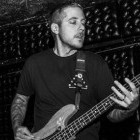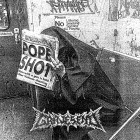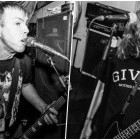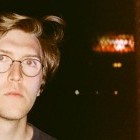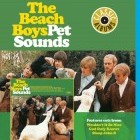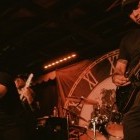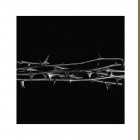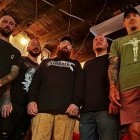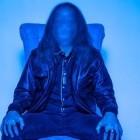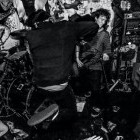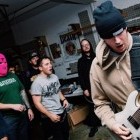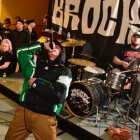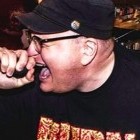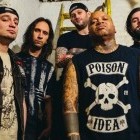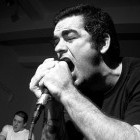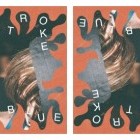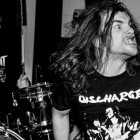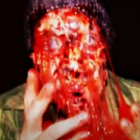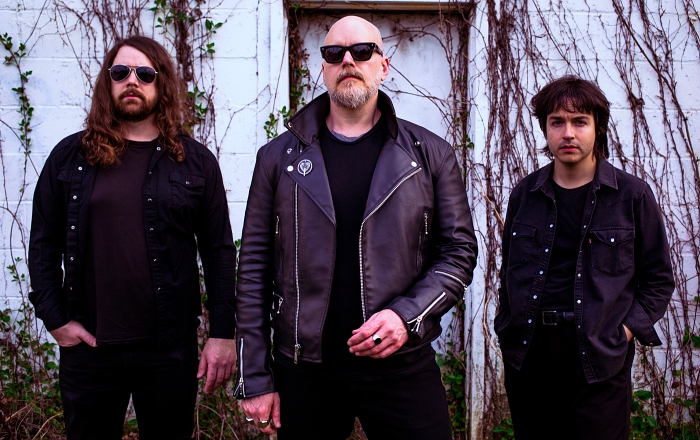
Fotocrime is the brainchild of singer/guitarist/producer Ryan Patterson, who started the trio in 2017 after his former band, Coliseum, broke up after over a decade together.
Comprised of Patterson, guitarist Nick Thieneman, and bassist Will Allard, Fotocrime specializes in a sound that has its tentacles in everything from darkwave to synthpop to the kind of stuff you'd hear on late-night alternative radio shows in the late '80s and early '90s.
Fotocrime will be releasing their fourth studio album, Accelerated, this coming September, and since I've been playing the hell out of an advance copy of it these past few weeks, I wanted to chat with Ryan about it.
We also talk about Ryan's background in the Louisville hardcore scene and the influences that has informed Fotocrime's discography.
Since your personal discography stretches back to the ‘90s hardcore punk scene, I was curious to find out if you always daydreamed about making music like the kind you do with Fotocrime? I ask since it’s so far removed from the work you did with Automatic and Enkindel(s), and certainly Coliseum.
Not necessarily dreamed about, but it’s been in my musical DNA since I was young. I was a pre-teen in the late '80s and I was obsessed with The Cure, Depeche Mode, and most things that were played on MTV’s 120 Minutes.
When punk and hardcore came into my life, the bands I discovered at that time made the idea of getting a guitar and writing a song more accessible. The Cure was more guitar-based so it bridged that gap somewhat, but as much as I listened to Depeche Mode’s Violator over and over in 7th grade, I never thought about how it was created… It seemed otherworldly.
Coliseum existed for 12 years, and we changed quite a bit over that time. The transition from the final Coliseum album, Anxiety’s Kiss, to Fotocrime didn’t seem entirely jarring to me and fans of Coliseum could clearly hear the post-punk elements in our last three albums. There’s certainly a stylistic difference from the early Coliseum material, but that was 20 years ago, and I think anyone who doesn’t change and grow personally and creatively over multiple decades is doing themselves a disservice.
All my favorite artists in all fields were multifaceted, they took risks and big swings throughout their years of output and that’s always very exciting to me.
The Enkindels and Automatic were bands I joined in my late teens, over 25 years ago, each for relatively brief periods of time. They were my first touring bands, I had a lot of fun and learned a lot, we had a lot of wild adventures touring in those pre-internet days.
I was so young and that was so long ago that neither band has any relevance in regard to the music I make now. That said, it’s all part of my ongoing journey and life in music and I’m thankful for the experiences and love those people.
Was there a moment in the earliest stages of Fotocrime where something clicked and it felt like you were onto something worth pursuing further? Maybe it was a song?
That was probably “Nadia” or “Autonoir” from the first album, Principle of Pain. In 2016, I worked on new music for a year alone in my practice space. I was trying to find my voice, both vocally and in terms of a sonic perspective, and start something from a clean slate, which was both exhilarating and terrifying. “Nadia” was a song that felt propulsive with its guitar hooks and synth arpeggios, but also felt easy to sing and employed my natural singing voice for maybe the first time.
“Autonoir” touched on a lot of things I was obsessed with musically—Suicide, Portishead, Roy Orbison, the Misfits rockabilly songs on Legacy of Brutality—and the film noir cinematic feeling I wanted to capture with Fotocrime.
That said, through all that time no one else heard any of the music or demos, so it wasn’t until I was finally tracking that album in early 2017 with J. Robbins at his studio that I knew it was working and cohesive. Making that album was revelatory for me.
Listening to the advance of Accelerated, it feels like the most realized Fotocrime material yet. The stylistic aspects you’ve mined influence from are still there, but the songs hold up on their own. The vocal melodies are also your best yet. How much pressure did you put on yourself while writing the album?
That’s great to hear all around, thank you. I don’t think I felt much pressure in terms of the songwriting, I always push myself but I’m writing songs to please myself and my bandmates first and foremost. I find writing and recording music to be incredibly fun and rewarding, it’s exciting at every step and I love it.
While I’m always trying to grow in all the different aspects of making an album—as a singer, songwriter, musician, designer, and now also producer and engineer—my specific goals with Accelerated were definitely having a vocal performance that I was proud of but also writing songs that were immediate and catchy that played to the strengths of my bandmates Nick and Will.
Nick and Will are each incredible musicians (as well as wonderful songwriters in their projects Fool’s Ghost and Aon Brasi) and I wanted Accelerated to not be a solo album as the previous Fotocrime albums had primarily been.
I wanted to involve all three of us throughout, so I suppose I felt some self-imposed pressure to accomplish that. I’d get the songs to a point where I could bring them in and they’d lend their talents in whatever way the songs called for, which included Nick playing most of the guitar on the album and singing a lot and Will playing bass, keys, and some guitar and backing vocals.
In some cases, they’d write guitar or bass parts, sometimes help with arrangement and dynamics. Even though I’m not sure they are even fully aware of how much of an impact they had on the record, I think it improved it tremendously overall and it was a more fun and less isolating experience for me. I’m very thankful for them as bandmates and close friends.
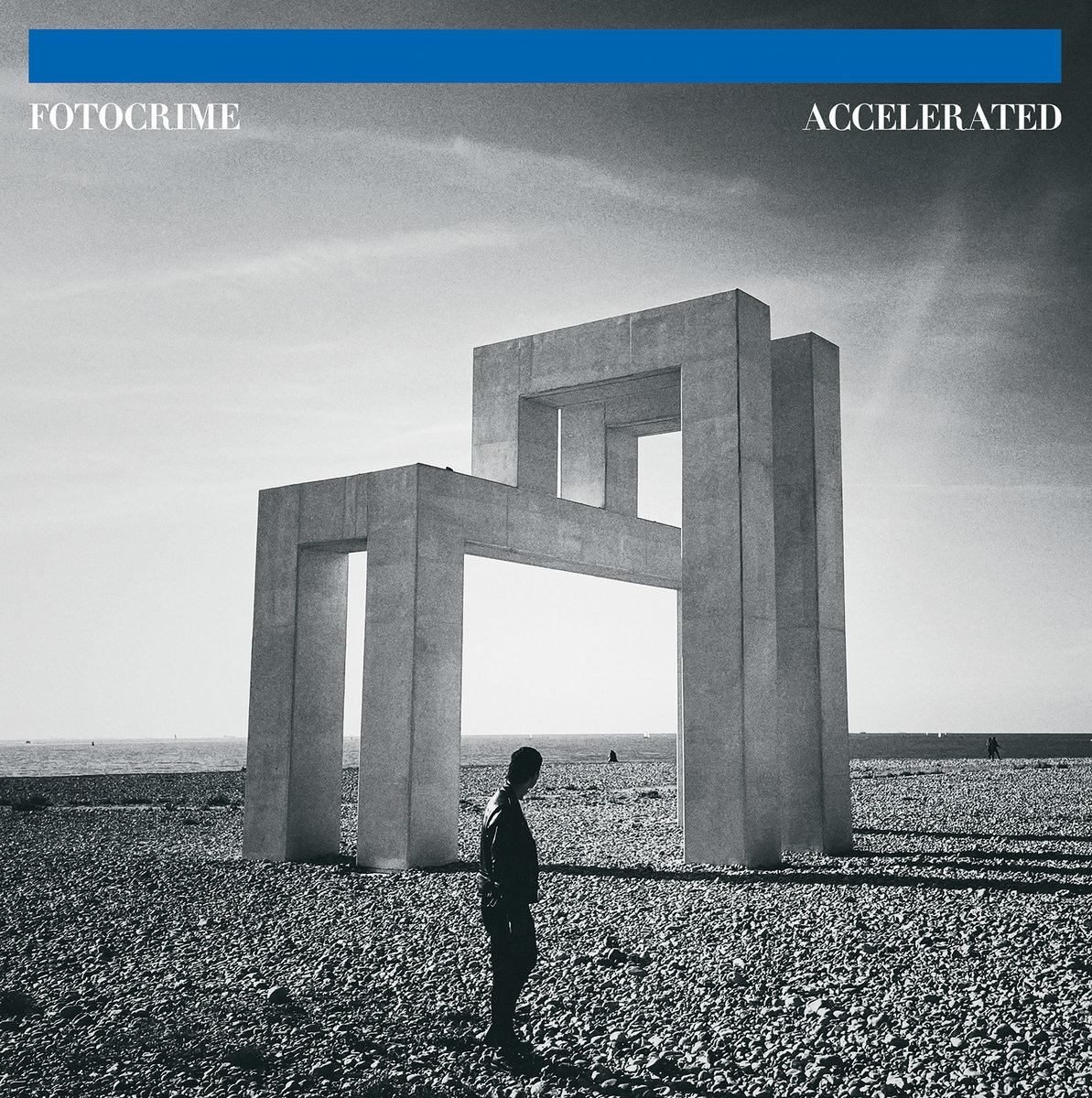
There are several songs on Accelerated that got stuck in my head. One of those would be “Match Factory Girl.” Tell me a bit about that song and its lyrics.
“Match Factory Girl” was lyrically loosely inspired by a Finnish film from 1990 with that title. In the film, the main character is an extremely introverted factory worker who is humiliated and abused by people in her life, at the end of the movie she quietly enacts her revenge on all of them.
I find myself imagining class warfare more and more these days, so the song is a lyrical narrative where the Match Factory Girl of the title takes her revenge by burning down the metaphorical fortresses of the bourgeoisie. The ruling class is led to the gallows as what was once their palace becomes their prison. Their crowns are melted and the gold seeps into the ground. It’s a capitalism-run-amok revenge fantasy.
Musically, it was a blast to record, a straight-ahead four-on-the-floor barnburner. Nick’s guitar is bouncing through a rhythmic triple-head tape delay, Will’s bass is pounding throughout, and he gives a great backing vocal performance in the bridge. I love the brassy, fizzy filtered synth sequence at the top and the polyrhythmic conga drums that come in before the final chorus. I believe it was the final song written and recorded for the album.
Now that you’ve been doing Fotocrime for while now do you feel way more comfortable in the vocal booth? I imagine it took some getting used to using such a different side of your voice when you first started tracking the Always EPs.
On this album, I’m far and away the happiest I’ve been with my vocal performance. I do feel comfortable singing, but my natural speaking voice is fairly low and before Fotocrime I always found myself fighting against that range.
With Fotocrime in general, and on Accelerated in particular, I tried to embrace that depth and look to my heroes with low and unmistakable voices for inspiration. Mark Lanegan, Leonard Cohen, Simon Bonney, and Blixa Bargeld are always North Stars when I’m looking for guidance.
With the exception of the song “On the Edge of the Light,” you recorded Accelerated at your home studio. Why did you decide to track that song with J. Robbins? Whatever the reason, it all feels and sounds cohesive.
Outside of my various bandmates in my various bands, J. has been my most frequent collaborator. He’s recorded and/or mixed most of the albums I’ve made in this and my previous bands, as well as many EPs and various other sessions.
With the previous Fotocrime album, Heart of Crime, I recorded it all myself at my house but it was my first time embarking on such a huge recording project all on my own. So, I had J. consult on the mixes, mix one of the songs entirely, and appear on a few tracks on the record. He’s been a personal and recording mentor to me and a massive part of my life.
Coliseum had recorded with J. at legendary DC punk studio Inner Ear in July 2010, we had a day off on tour and I’d always dreamed of recording there, so it worked out that half of Coliseum’s Parasites EP was recorded there. In 2021, when I heard that Don Zientara was going to close Inner Ear, I contacted J. to see if Fotocrime could go record there for a day. I wanted to get in one last time and it turned out to be a very meaningful day for all of us as it was also J.’s last time engineering there.
At that session, we tracked everything live in the studio the way a band of our ilk may have 30 years ago. The drum machine ran direct to the 2” tape machine, the synths were clocked to the drums via MIDI, the three of us all performed live, and even the vocals to “On the Edge of the Light” were recorded live in the studio. It was a blast.
We recorded three songs, including a Government Issue cover we released on our Alcoves covers EP in 2022 and a third song that’s unreleased so far. “On the Edge of the Light” became our set opener over the past couple of years and felt like it was a perfect album opener. It’s great to have that bit of history connected to this album and to continue to have J. involved even as I now mostly record myself in my own studio, House of Foto.
On a side note, I bought a couple of pieces of studio gear from Don Zientara when Inner Ear closed, including a rare, old chorus unit that I hope was used on some of the classic records he made that utilized that sound so well. (I use it all the time.) Don coincidentally came to Louisville in late 2021 on a trip and brought the gear here for me.
I picked his brain over lunch, and he told me an amazing story I’d never heard about Minor Threat playing his daughter’s school carnival. They were the music for games of musical chairs for the school kids. I had him sign the gear I bought from him and it’s incredibly meaningful to have that in my studio and use it on my recordings.
Do you ever bust out any No Salvation riffs during Fotocrime soundcheck?
I saw an episode of some TV show once where a character was a former rocker who often sat around playing their old bands’ songs in their apartment. Seemed pretty sad to me.
***
Accelerated will be out on September 8th via Artoffact Records (pre-order).
Fotocrime on social media: Facebook | Twitter | Instagram
Tagged: fotocrime

